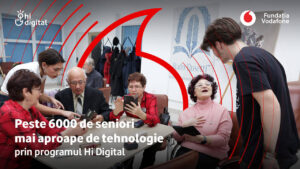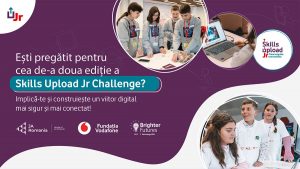How a restored loom has brought together two generations.
by Diana Oncioiu
Mrs. Geta, a tall and determined woman, takes off her black shoes, covered in dust after walking on the country road and puts on her slippers, knitted with her own wool by a neighbor from the village. She only knits socks. She sits at the 70 year old loom and starts pressing the two wooden pedals. This generates the movement of two threads which, in turn, lift the warp threads through which Mrs. Geta patiently inserts colored pieces of fabric.
Geta Duțu is 58 years old and comes to the Multifunctional Center from the Village Lanurile from Brăila County, to teach the children a forgotten craft. When she got married, she received the 70 year old loom from her mother in law. She used it to make rugs, bed covers, carpets for almost the entire village. For the past seven years or so, since one of her five children passed away, Mrs. Geta has weaved rarely. It takes a great deal of focus, which she no longer has, especially for more complex works. It’s easier with rugs, so she accepted the Center’s challenge. Furthermore, she’s not alone. She receives the help of Sanda Sâmpetru.
Mrs. Sanda is 77, a widow for almost one year, has five grandchildren and 18 chickens. As her three sisters, she got married with a dowry woven by her mother. Today,“nobody weaves anymore”, she complains. “They buy everything done and it’s nonsense”.
Iulia, a ten year old little girl, has learned how to sew from Mrs. Sanda. She watched her carefully and then did exactly the same. Iulia is in 4th grade and is among the last children to leave the Center, in the evening, after several workshops. She believes that the most important aspect in weaving are the legs, and she always strikes rhythmically and strongly the loom’s pedals. Since she gets bored at home, Iulia attends almost all the workshops from the Multifunctional Center: guitar, violin, organ, traditional dances, and choir. The center also hosts arts classes, modern dances, chess or math training sessions.
All these activities are possible for 80 children due to the Initiative Group for Integrated Development from the Lanurile Village. With the RON 31,500 funding granted in September 2015 by the Foundations PACT and Vodafone Romania, the residents have purchased a digital piano, an organ, two violins, four guitars and one accordion. They have brought twice a week a psychologist, to talk to the students in 7th and 8th grade, and also to their parents, about dropping out of school. Mrs. Geta provided her own loom to all children willing to learn about weaving. In mid-April, the children included in the project will go on their first trip to Iași, Suceava and Piatra Neamț.
The coordinator of the group consisting of eight people is Daniel Ivan, a 2nd grade teacher at the local school and a guitar and violin teacher at the Center. Daniel, aged 34, comes from a simple family of teachers. His mother and father still teach at the local school, and his sister teaches Romanian at a school in Constanța. The teacher would like the little ones to benefit from what he could not, during his childhood. He would have liked, for instance, to learn to play the piano, when he was Iulia’s age.
Daniel is not paid for the days spent at the Center, including the weekends, yet he does not complain at all. He claims to do all these things because he feels that he must pass forward what he knows, whether it’s guitar or violin lessons. He displays modesty and a certain shyness when listing the things he’s good at. He doesn’t want people to think that he is bragging. Furthermore, he knows it’s only the begining of the road. The project funded by the Foundations PACT and Vodafone Romania was the initiative group’s first project. They hope more will follow. The village has talented children who, unfortunately, go to dance and sing at their neighbors’ homes, as in Lanurile there is a festivity hall and a house of culture only theoretically. Currently, the first is hosting the trash cans which are yet to be distributed to people and the house of culture is decommissioned.
While Mrs. Geta is weaving, Mrs. Sanda is knitting a vest. They are surrounded by 24 singing children, from preparatory, to 4th grade. They start with a song about spring, then continue with one about childhood and another one about the mother. Finally, Iulia gives them the tone from the electric piano. This is followed by the solo of an 11 year old boy, blond, with tiny eyes. The choir teacher claims that the boy is very talented. Mrs. Sanda has the same opinion. After the boy finishes the song, he leaves the needles and applauds with all the other children. He likes the Center: “You hear a word, a song, from one or the other”.
In the NGO language , such an activity is called a cross-generation transfer. For Daniel and the participants it is a social soiree. A more modern one, taking place during the day, instead of the evenings, in spring, and not winter, and missing only the stove. The present elements though are songs, cheerfulness, tradition, curiosity and willingness to learn. After they have finished singing, the children gather around the loom, ask questions and take turns to replace Mrs. Geta and weave. Around 3 PM, they all go to their own homes. Mrs. Geta takes off her slippers, puts them in a bag, puts on her black shoes and leaves too. Daniel is left behind, to make sure everything is alright. Tomorrow, the children have guitar and piano lessons.
This material was drafted in a partnership with Decât o Revistă, within the founding round Involved in my community, conducted by the Foundation Vodafone Romania and the PACTFoundation. You can find more stories on involvement on the platform oameniisudului.com, developed by the PACT Foundation.




